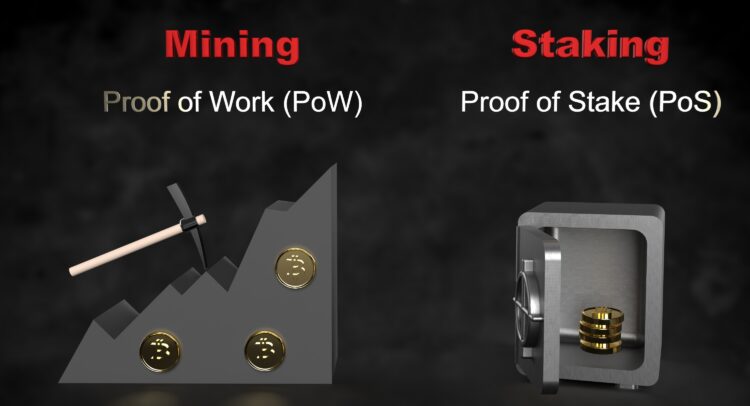As Bitcoin (BTC-USD) continues to hog the crypto limelight with its Proof of Work (POW) model, a quieter and cheaper version has come in the form of Proof of Stake (POS). Let’s break down Proof of Stake, how it ticks, and what makes it different from POW.
The Basics: What are POW and POS?
Proof of Work (POW) and Proof of Stake (POS) are two primary mechanisms used to achieve consensus on the blockchain, which is just a fancy way of saying how transactions are verified and how new blocks are created.
POW is akin to a mathematical race, where miners solve complex problems to validate transactions and create new blocks on the blockchain. This method, while secure, consumes a large amount of electricity, akin to powering a country. No, really, the energy usage and requirements to mine POW blockchains like BTC are huge.
As of December 2023, the energy consumption of mining Bitcoin per year is equivalent to:
- 42% of the U.K.’s total power usage.
- 55% of Australia’s total power usage.
- 117% of The Netherland’s usage.
On the other hand, Proof of Stake chooses its validators based on the amount of cryptocurrency they hold and are willing to “stake” as collateral. This method is more energy-efficient and allows for faster transactions and greater scalability. How much more efficient? It’s not even apples to oranges; it’s apples to space shuttles.
For example, to run Cardano’s (ADA-USD) POS network over a year takes the power usage of all your neighborhood’s refrigerators. That’s it.
The evolution from POW to POS signifies a shift towards more sustainable and efficient blockchain technologies. Unlike the resource-intensive POW model, POS assigns validation power based on the proportion of coins held by a node, promoting energy efficiency and faster transaction validations.
A Step-by-Step Guide to POS Transactions
The process of validating transactions in POS is streamlined:
- Transaction Initiation: Alice sends Bob 5 crypto coins.
- Block Proposal: A chosen validator proposes a new block containing this transaction based on their stake.
- Validation: Other validators verify the block’s accuracy.
- Block Addition: Once consensus is reached, the block is added to the blockchain.
- Reward Distribution: The validator(s) earns transaction fees as a reward.
Security and Sustainability: Why POS Could Lead the Future
POS speeds up transaction processing and significantly cuts down on power consumption. Requiring validators to stake their coins/tokens/crypto ensures that they have a vested interest in the accuracy and security of the transactions, tying security to their financial well-being. This makes POS as secure as POW and often more efficient and environmentally friendly.
Additionally, almost anyone can participate and make income from POS. The days of an individual mining Bitcoin in their basement are over. To make mining Bitcoin economical, billions of dollars are now needed in infrastructure and equipment. To do the equivalent of POW on a POS blockchain, it’s as simple as delegating your crypto to a node, then sit back, relax, and let the rewards for helping maintain the network come in.
Will POS Replace POW? Weighing the Possibilities
While POS offers several advantages over POW, particularly regarding energy efficiency and scalability, will it replace POW?
POW has a proven track record with significant adoption, as seen with Bitcoin. However, as environmental concerns grow and technology advances, POS is increasingly becoming the preferred choice for new and evolving blockchains.
Proof of Stake is not just an alternative to Proof of Work; it represents a shift towards more sustainable, equitable, and scalable blockchain technology. As the crypto landscape evolves, the role of POS is likely to expand, potentially setting new standards for securing and validating digital transactions.
Don’t let crypto give you a run for your money. Track coin prices here









